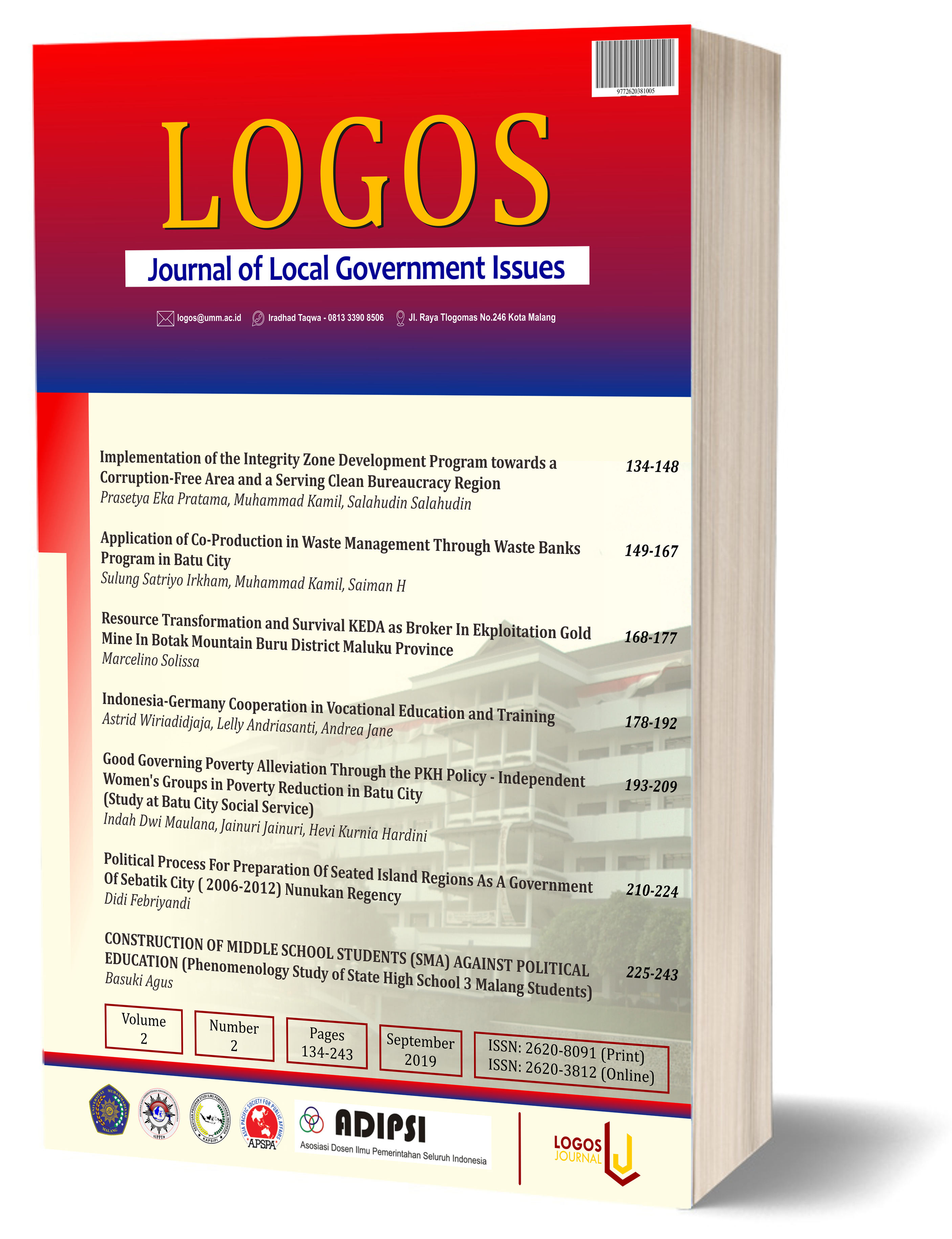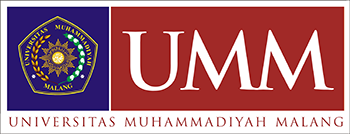Good Governing Poverty Alleviation Through the PKH Policy - Independent Women's Groups in Poverty Reduction in Batu City (Study at Batu City Social Service)
DOI:
https://doi.org/10.22219/logos.Vol2.No2.193-209Abstract
Good Governing Poverty Alleviation is a poverty reduction program by implementing a model of Good Governance in this context in the Family Hope Program - Independent Women's Group involving actors in the state, society and private sector. Handling the poverty problem of the Batu City Government in accordance with the Good Governance model through a partnership pattern established with the private sector, KPM and Batu City Social Service is expected to be able to create independent women's groups that are able to try to develop their creativity to rise from poverty for themselves and their families .
This research uses descriptive qualitative method with data collection techniques such as, observation, interviews and documentation and other data that supports this study both primary and secondary. Based on the results of the study of "Good Governing Poverty Alleviation" through PKH Policy - Independent Women's Groups in Poverty Alleviation in Batu City where there are several problem formulations namely Independent Women's Groups in Poverty Alleviation, Implementation and Dynamics of alleviation Good Governing Poverty through PKH Policy - KPM in Poverty Alleviation Women's Empowerment through Independent Women's Groups in Batu City. The results of this study, namely this policy has actually been well-integrated but in the implementation or implementation at the regional level in this case Batu City has not shown an integration model because there is something that has not been realized normative. What is intended is that the Standard Operating Procedure (SOP) has not been regulated in this policy, there are dynamics such as the KPM human resource capacity that is still below the standard so that the policy implementation and private enthusiasm in implementing this policy very, empowering women through KPM is one of the efforts to improve the economy of KPM through a partnership scheme with entrepreneurs in Batu City.
Downloads
References
Barr, N. (2012). Economics of the welfare state, Oxford university press.
Badan Pusat Statistik “ Garis Kemiskinan” https://www.bps.go.id/subject/23/kemiskinan-dan-ketimpangan.html
Badan Pusat Statistik, “Persentase Penduduk Miskin” https://www.bps.go.id/pressrelease/2018/07/16/1483/persentase-penduduk-miskin-maret-2018-turun-menjadi-9-82-persen.html.
Bogdan, R. C. and S. K. Biklen (2007). "Research for education: An introduction to theories and methods." Boston, MA: Allen and Bacon.
Meijers, E. and D. Stead (2004). Policy integration: what does it mean, and how can it be achieved? A multi-disciplinary review. Berlin Conference on the Human Dimensions of Global Environmental Change: Greening of Policies-Interlinkages and Policy Integration. Berlin.
Miles, M. B., et al. (1994). Qualitative data analysis: An expanded sourcebook, sage.
Miftah Thoha (S.H Sarundajang, 2005), dalam jurnal Penerapan Good Governance Dalam Tata Kelola Pemerintahan Di Kantor Kecamatan Modoinding Kabupaten Minahasa Selatan, Natalia Gratia Sanding, Marlien Lapian, Josef Kairupan, Jurnal Jurusan Ilmu Pemerintahan, Volome 1 No. 1 Tahun 2018, Fakultas Ilmu Sosial dan Politik Universitas Sam Ratulangi, ISSN : 2337 – 5736.
Poerwanti, E. (1998). "Dimensi-dimensi riset ilmiah." UMM Pers, Malang.
Soeun, S. (2005). Kebijakan pengentasan kemiskinan dalam perspektif Good Governance:: Studi kasus Program Pemberdayaan Daerah dalam mengatasi dampak krisis ekonomi (PDM-DKE) di Desa Ambarketawang Kecamatan Gamping Kabupaten Sleman, Universitas Gadjah Mada.
Sugiyono (2008). "Metode penelitian bisnis." Bandung: Pusat Bahasa Depdiknas.
Sugiyono (2014). "Metode Penelitian Kuantitatif, Kualitatif dan R&D." Alfabeta. Bandung.
Suharto, E. (2005). Membangun Masyarakat Memberdayakan Rakyat Kajian Strategis Pembangunan Kesejahteraan Sosial dan Pekerjaan Sosial, PT Refika Aditama.
Sukmana, O. (2017). "Konsep dan Desain Negara Kesejahteraan (Welfare State)." JURNAL SOSIAL POLITIK 2(1): 103-122.
Susetio, W. (2007). "Konsep Welfare State dalam Amandemen UUD 1945: Implementasinya dalam Peraturan Perundang-Undangan (Beberapa Tinjauan dari Putusan MKRI)." Lex Jurnalica 4(2).
Dokumen Rencana Kerja Pemerintah Daerah (RKPD Kota Batu, 2017)
209
Please Cite This Articel As : Indah Dwi Maulana et al., “Good Governing Poverty Alleviation” Through The PKH Policy - Independent Women's Group in Poverty Reduction in Batu City (Study at Batu City Social Service): Journal of Local Government Issues (LOGOS), https://doi.org/10.22219/LOGOS.Vol2.No2.193-209
Peraturan Menteri Sosial Republik Indonesia Nomor 1 Tahun 2018 tentang Program Keluarga Harapan.
Peraturan Menteri Sosial Republik Indonesia Nomor 18 Tahun 2017 tentang Pelimpahan Kewenangan Dekonsentrasi Dan Penugasan Tugas Pembantuan Kepada Dinas Sosial Daerah Provinsi dan Dinas Sosial Daerah Kabupaten/Kota Tahun Anggaran 2018.
Peraturan Wali Kota Nomor 26 Tahun 2015 tentang Percepatan Penanganan Masalah Kemiskinan melalui Pola Kemitraan Kelompok Perempuan Mandiri Program Keluarga Harapan
Peraturan Menteri Sosial Republik Indonesia Nomor 18 Tahun 2017 tentang Pelimpahan Kewenangan Dekonsentrasi Dan Penugasan Tugas Pembantuan Kepada Dinas Sosial Daerah Provinsi Dan Dinas Sosial Daerah Kabupaten/Kota Tahun Anggaran 2018.
Peraturan Wali Kota Nomor 26 Tahun 2015 tentang Percepatan Penanganan Masalah Kemiskinan melalui Pola Kemitraan Kelompok Perempuan Mandiri Program Keluarga Harapan.
Downloads
Published
How to Cite
Issue
Section
License
Copyright (c) 2019 Indah Dwi Maulana, Jainuri Jainuri, Hevi Kurnia Hardini

This work is licensed under a Creative Commons Attribution-ShareAlike 4.0 International License.
Authors who publish with this journal agree to the following terms:
- Authors retain copyright and grant the journal right of first publication with the work simultaneously licensed under a Creative Commons Attribution-ShareAlike 4.0 International License. that allows others to share the work with an acknowledgment of the work's authorship and initial publication in this journal.
- Authors are able to enter into separate, additional contractual arrangements for the non-exclusive distribution of the journal's published version of the work (e.g., post it to an institutional repository or publish it in a book), with an acknowledgment of its initial publication in this journal.
- Authors are permitted and encouraged to post their work online (e.g., in institutional repositories or on their website) prior to and during the submission process, as it can lead to productive exchanges, as well as earlier and greater citation of published work (See The Effect of Open Access).

This work is licensed under a Creative Commons Attribution-ShareAlike 4.0 International License.













